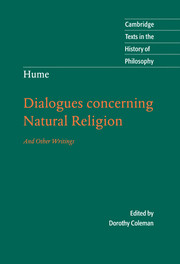Book contents
- Frontmatter
- Contents
- Acknowledgments
- Introduction
- Chronology
- Further reading
- Note on the text
- List of abbreviations
- DIALOGUES CONCERNING NATURAL RELIGION
- OTHER WRITINGS
- From Hume's memoranda
- Fragment on evil
- Letter to Francis Hutcheson, March 16, 1740 (extract)
- Letter to William Mure, June 30, 1743 (extract)
- Letters to Gilbert Elliot (extracts)
- From The Natural History of Religion
- Selections from Bayle
- Index
- Cambridge Texts in the History of Philosophy
Letters to Gilbert Elliot (extracts)
Published online by Cambridge University Press: 05 June 2012
- Frontmatter
- Contents
- Acknowledgments
- Introduction
- Chronology
- Further reading
- Note on the text
- List of abbreviations
- DIALOGUES CONCERNING NATURAL RELIGION
- OTHER WRITINGS
- From Hume's memoranda
- Fragment on evil
- Letter to Francis Hutcheson, March 16, 1740 (extract)
- Letter to William Mure, June 30, 1743 (extract)
- Letters to Gilbert Elliot (extracts)
- From The Natural History of Religion
- Selections from Bayle
- Index
- Cambridge Texts in the History of Philosophy
Summary
Editor's note: Gilbert Elliot was one of Hume's close friends. Despite their religious differences, Elliot had supported Hume's candidacy for an academic appointment at the University of Glasgow in 1752, though Hume was again passed over because of his anti-religious views. Despite Elliot's support in this regard, he strongly advised Hume against publishing the Dialogues. His response to Hume's request for assistance in strengthening Cleanthes' argument did not go further than to echo views that Hume already had Cleanthes express in Part 3 of the Dialogues, such as that a survey of order and mutual adaptation among the parts of nature naturally leads to belief in an intelligent designer, a belief that strikes with a force like that of sensation, based more on feeling or sentiment than on subtle reasoning.
Letter of February 18, 1751 (extract)
Dear Sir,
Your notion of correcting subtlety by sentiment is certainly very just with regard to morals, which depend upon sentiment; and in politics and natural philosophy, whatever conclusion is contrary to certain matter of fact must certainly be wrong, and there must some error lie somewhere in the argument, whether we be able to show it or not. But in metaphysics or theology, I cannot see how either of these plain and obvious standards of truth can have place. Nothing there can correct bad reasoning but good reasoning: and sophistry must be opposed by syllogism.
- Type
- Chapter
- Information
- Hume: Dialogues Concerning Natural ReligionAnd Other Writings, pp. 118 - 123Publisher: Cambridge University PressPrint publication year: 2007



